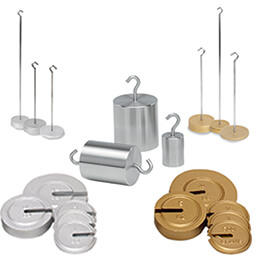
This blog will discuss the various sets of classes of weights, including ASTM, OIML, and NIST.
Calibration weights are standard in most labs as they ensure that lab balances provide you with accurate readings. However, they are not all the same. Higher weight classes should be used for quality or laboratory equipment depending on the balance’s readability and specific weighing applications. Also, there are various sets of classes of weights, including ASTM, OIML, and NIST. This article, we will discuss the different classes of calibration weights and other factors to consider for purchasing the weights.
What are the Classes of Weights?
There are three primary calibration weight class systems that you’ll come across:
- The NIST Class F weights are frequently involved in industrial settings. They are also used in manufacturing environments and warehouses to calibrate scales for producing or shipping significant products. In addition, NIST Class F weights are not usually used in laboratories as they are not sufficiently accurate to determine the scales used for laboratory applications. Remember that Class F is no longer sold for calibration of scales, but the existing Class F weights can still be used.
- ASTM is the most popular weight class in the United States. The higher the class number, the higher the tolerance level (and less accurate) the weight will be. Class 0-3 can be used in laboratory or quality labs. Classes 4-7 are commonly used in harsh manufacturing environments.
- OIML would use M1, M2, and M3 for weights in their industrial environment. Additionally, most laboratories require OIML weights of Class F2 or below. OIML class weights are prevalent outside the United States.
Guide to Choosing Test Weights for Your Scale or Balance
Furthermore, you’ll have several options when browsing calibration weights – NIST, ASTM, OIML.
Material
Cast iron is usually used for NIST Class F, ASTM Classes 6 & 7, and OIML Classes M1 & M2. Cast iron weights are only acceptable for weights 20 lbs. and heavier. Additionally, the higher-class weights OIML E1, E2, and F1 and ASTM 000-4 will typically be stainless steel, and you should not touch it with bare hands.
Shape
Besides the choices for test weight material, the test weights are available in several shapes based on how you plan to use them. The most prevalent shapes are grip handle, slotted, leaf, and cylindrical.
- Grip handle weights are usually NIST Class F, ASTM Class 6 & 7, or OIML Class M1 & M2. They are generally made of cast iron and are involved in high-capacity scales.
- Also, slotted weights are included in applications that require hanging test weights. They are also normally cast iron and have the same classes as grip handle weights.
- Leaf test weights are used to calibrate high precision and high-resolution balances. Due to their class and size, you should handle them with protective gloves and tweezers.
- Lastly, cylindrical weights are available as Class F weights for calibrating lower capacity scales, bench scales, and precision balances. Moreover, these weights can handle several applications despite being typically 10 lbs. and lighter.
CONTACT THE SCALE PEOPLE FOR WEIGHING EQUIPMENT AND CALIBRATION SERVICES!
Since 1956, The Scale People have earned a reputation as the best service provider for calibrating and repairing weighing equipment in the mid-Atlantic area. Our sales team can help you to find the best weighing equipment for your application. We currently have offices in Columbia, MD, and Newport News, VA, but we offer our services nationwide. Over the years, we have built a long list of satisfied clients from various industries, including pharmaceutical, food and beverage, and government manufacturing. We are a fully ISO/IEC 17025:2017 accredited service company offering calibration for balances, scales, dynamometers, force measurements, test weights, pipettes, and more. All our services have a 100% satisfaction guarantee. We’re only a phone call away at +1 (800) 451-9593. Follow us on Facebook, Twitter, and LinkedIn to learn more about our work.
